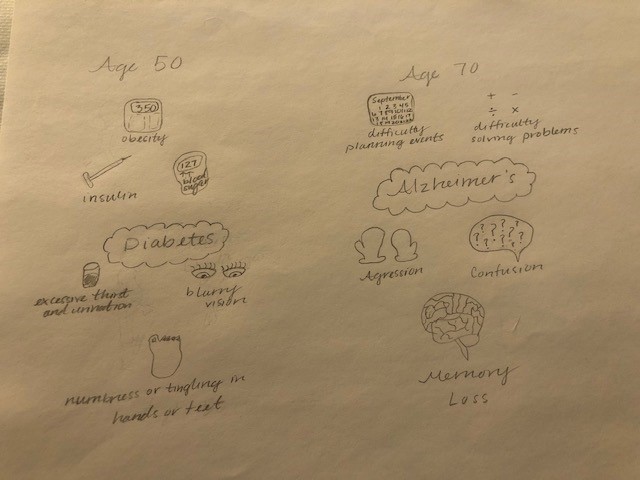Dementia and diabetes are two of the most prevalent health problems facing the world today. Countless resources are spent on treating the symptoms of each, though no clear cause is known for either.
Type two diabetes occurs when blood glucose levels are too high. Blood glucose is the primary way your body gets nutrients from the food you eat. Symptoms of diabetes include:
- excessive thirst and urination
- blurred vision
- increased hunger
- unexplained weight loss
- tingling or numbness in hands or feet
- sores that do not heal
The latter two more commonly occur in prolonged untreated diabetes which often results in greater severity of symptoms.
Risk factors for diabetes include:
- age 45 or older
- have a family history of diabetes
- overweight or obese
One of the most interesting aspects of this relationship is the idea of leptin signaling. Leptin is a hormone released to regulate energy expenditure. In simple terms, leptin tells you to stop eating. Leptin levels are correlated closely with body weight. When diabetes leptin signaling is impaired, people can develop leptin resistance which is often correlated with insulin resistance. Insulin is a growth hormone involved with turning nutrients into useful energy for the body. When the body no longer reacts to insulin, it is called insulin resistance. In the brain, when this happens the impacts can reach the hypothalamus. This body-brain connection has been theorized to be an important link in understanding the relationship between increased risk of Alzheimer’s disease in individuals with type 2 diabetes. First, let’s talk a little bit about what Alzheimer’s disease really is.
Alzheimer’s is a neurodegenerative disease that results in memory loss. It occurs primarily in the older population but a few cases of early onset Alzheimer’s have been reported. There are two main theories behind the cause of Alzheimer’s. Neurofibrillary tangles are one whereas ABO plaques are another. In simple terms, the brain begins to lose some of its primary structure and tissue begins to accumulate before being “cleaned up” by microglia in the brain. This “cleaning up” often results in a loss of a large portion of brain tissue. Symptoms of Alzheimer’s disease include:
- Memory loss
- Difficulty solving problems
- Aggression
- Confusion
- Difficulty planning events
- Personality changes
There is a strong positive correlation between Alzheimer’s and Type two diabetes, though the exact signaling mechanism is still unknown. Release of insulin has been shown to improve longevity and flexibility of neurons through insulin receptors in the brain. Studies also revealed that many individuals with Alzheimer’s had impaired insulin pathways, though the exact correlation between the two diseases is yet to be fully understood. An article aimed to look at this relationship in a comprehensive way, not only studying the relationship, but looking for ways to better treat these diseases and expand the knowledge to the relationship between metabolism and neurobiology. The final message was clear: Each of these diseases needs more research. There is clearly a relationship between the disorders, but understanding just how to use this relationship requires greater research into such devastating health conditions in the world today.
